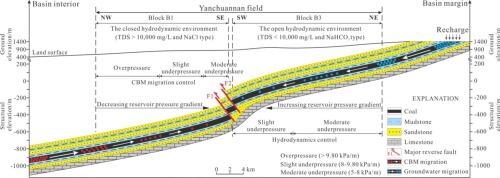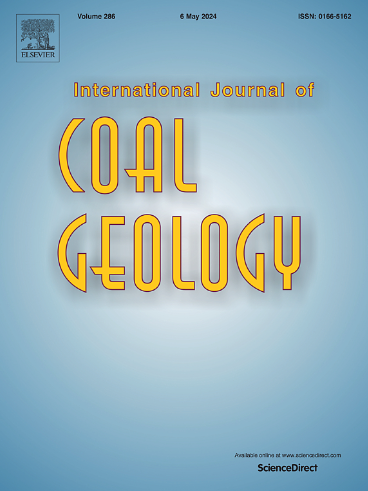对延川南煤田煤层气储层压力机制的地质和水文控制:对中国鄂尔多斯盆地东部深层煤层气开发的影响
IF 5.7
2区 工程技术
Q2 ENERGY & FUELS
引用次数: 0
摘要
位于鄂尔多斯盆地东南部的延川南煤田 2 号煤层气储层压力变化很大,分为超压(压力梯度为 9.80 kPa/m)、轻度欠压(压力梯度为 8-9.80 kPa/m)和中度欠压(压力梯度为 5-8 kPa/m)。通过对地质和水文特征的分析,对不同压力状态的控制因素进行了研究。在不同的水动力环境中,压力状态受不同机制的控制。在以 TDS > 10,000 mg/L 和 NaCl 型地下水为特征的封闭水动力环境中,压力状态以超压到轻微欠压为主,并受煤层气迁移控制。超压是由煤化过程中产生的热成煤层气形成的,并由构造隆升过程中向西北延伸并深埋的煤层气储层中的热成煤层气迁移来维持。从超压到轻微欠压,再到向东南方向的中度欠压,是随着迁移距离的增加,迁移的热成煤层气逐渐减弱的结果。在以 TDS < 10,000 mg/L 和 NaHCO3 型地下水为特征的开放水动力环境中,压力制度以轻微至中度欠压为主,并受水动力支配。地下水由构造隆升的盆地边缘的流星补给,并在构造隆升过程中形成了水动力框架。从中度欠压向西南方向过渡到轻度欠压,与盆地边缘到盆地内部的地面高程略有下降有关,也与地下水的径流强度随着与流星补给距离的增加而逐渐减弱有关。所建立的理想化压力机制模型可为鄂尔多斯盆地东部及其他地区煤层气田的深层煤层气甜点识别提供指导。本文章由计算机程序翻译,如有差异,请以英文原文为准。

Geological and hydrological controls on the pressure regime of coalbed methane reservoir in the Yanchuannan field: Implications for deep coalbed methane exploitation in the eastern Ordos Basin, China
The pressure regimes of the No. 2 coalbed methane (CBM) reservoir in the Yanchuannan field located in the southeastern Ordos Basin are highly variable and divided into overpressured (pressure gradient >9.80 kPa/m), slightly underpressured (pressure gradient of 8–9.80 kPa/m), and moderately underpressured (pressure gradient of 5–8 kPa/m). The controlling factors for the variable pressure regimes were investigated through the analysis of geological and hydrological characteristics. The pressure regimes are controlled by different mechanisms in different hydrodynamic environments. In the closed hydrodynamic environment characterized by TDS > 10,000 mg/L and NaCl type of groundwater, the pressure regime is dominated by overpressured to slightly underpressured and is controlled by CBM migration. Overpressure was developed by thermogenic CBM generation during the coalification process and is maintained by thermogenic CBM migration from the extended northwestward and deeply buried CBM reservoir during tectonic uplift. The transition from overpressure to slight underpressure and then to moderate underpressure towards the southeast is the result of the progressively weakened migrated thermogenic CBM with increasing migration distance. In the open hydrodynamic environment characterized by TDS < 10,000 mg/L and NaHCO3 type of groundwater, the pressure regime is dominated by slightly to moderately underpressured and is governed by hydrodynamics. Groundwater is fed by meteoric recharge along the structurally upturned basin margin and creates the hydrodynamic framework during tectonic uplift. The transition from moderate to slight underpressure towards the southwest is associated with the minor decrease range in ground elevation from basin margin to basin interior and the gradually weakened runoff intensity of groundwater with increasing distance to meteoric recharge. The idealized models for the pressure regimes are established, which can provide guidance to deep CBM sweet spot identification in CBM fields in the eastern Ordos Basin and elsewhere.
求助全文
通过发布文献求助,成功后即可免费获取论文全文。
去求助
来源期刊

International Journal of Coal Geology
工程技术-地球科学综合
CiteScore
11.00
自引率
14.30%
发文量
145
审稿时长
38 days
期刊介绍:
The International Journal of Coal Geology deals with fundamental and applied aspects of the geology and petrology of coal, oil/gas source rocks and shale gas resources. The journal aims to advance the exploration, exploitation and utilization of these resources, and to stimulate environmental awareness as well as advancement of engineering for effective resource management.
 求助内容:
求助内容: 应助结果提醒方式:
应助结果提醒方式:


